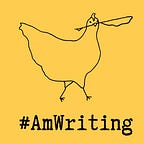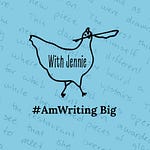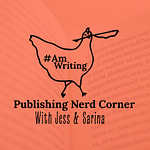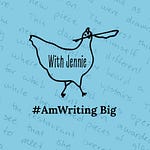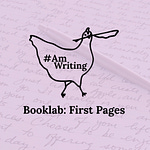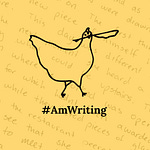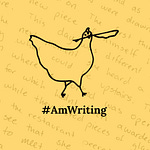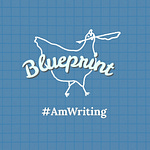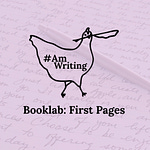More words, better words, in less time? Sometimes. In this episode, finding your own path to write faster.

If only we could write as fast as we type! You could set your clock by our book production, right? Not so. This week we’re exploring how to write faster with Sarina in the lead. Finding your own patterns, prewriting and avoiding that “stuck” feeling by finding tangible ways to explore your characters and book without doing battle with words dominate our conversation as we riff on ways to up our daily word counts without ending up with something that’s destined for the cutting room floor file.
Episode links and a transcript follow—but first, a preview of the #WritersTopFive that will be dropping into #AmWriting supporter inboxes on Monday, September 30, 2019: Top Five Reasons to Be on Instagram. Not joined that club yet? You’ll want to get on that. Support the podcast you love AND get weekly #WriterTopFives with actionable advice you can use for just $7 a month.
As always, this episode (and every episode) will appear for all subscribers in your usual podcast listening places, totally free as the #AmWriting Podcast has always been. This shownotes email is free, too, so please—forward it to a friend, and if you haven’t already, join our email list and be on top of it with the shownotes and a transcript every time there’s a new episode.
To support the podcast and help it stay free, subscribe to our weekly #WritersTopFive email.
LINKS FROM THE PODCAST
2k to 10k: Writing Faster, Writing Better, and Writing More of What You Love, Rachel Aaron
#AmReading (Watching, Listening)
Jess: She Said: Breaking the Sexual Harassment Story That Helped Ignite a Movement Jodi Kantor, Meghan Twohey
KJ: Podcasts for book recommendations: What Should I Read Next? with Anne Bogel and Get Booked, from BookRiot
Sarina: 100 Deadly Skills: The SEAL Operative’s Guide to Eluding Pursuers, Evading Capture, and Surviving Any Dangerous Situation, Clint Emerson
#FaveIndieBookstore NEWS
Jenny Lawson, author of You Are Here, Let’s Pretend This Never Happened, and Furiously Happy, will be opening Nowhere Books in San Antonio with the former GM of Book People. We love it when a new indie is born.
This episode was sponsored by Author Accelerator, the book coaching program that helps you get your work DONE. Visit https://www.authoraccelerator.com/amwritingfor details, special offers and Jennie Nash’s Inside-Outline template.
Find more about Jess here, Sarina here and about KJ here.
If you enjoyed this episode, we suggest you check out Marginally, a podcast about writing, work and friendship.
The image in our podcast illustration is by Jordan on Unsplash.
Transcript (We use an AI service for transcription, and while we do clean it up a bit, some errors are the price of admission here. We hope it’s still helpful.)
KJ: 00:01 Hey writers, are you whispering to yourself that this might just be your year to make NaNoWriMo happen? Or maybe planning to do it again? Then, do yourself a favor and invest in Author Accelerator's Inside Outline coaching now, so that you've got a structure to free you up to use those 30 days in November to write something that really works. It is no fun to 'win' NaNoWriMo with 56,000 words and then realize 35,000 of them don't serve your story at all. Trust me, I speak from experience. The Inside Outline really works. Find out more at authoraccelerator.com/insideoutline.
Jess: 00:36 Go ahead.
KJ: 00:36 This is the part where I stare blankly at the microphone like I don't remember what I was supposed to be doing.
Jess: 00:36 All right, let's start over.
KJ: 00:36 Awkward pause, I'm going to rustle some papers.
Jess: 00:36 Okay.
KJ: 00:36 Now one, two, three. I'm KJ Dell'Antonia and this is #AmWriting. #AmWriting is the podcast, your podcast we hope, about writing all the things, short things, long things, fiction, nonfiction, genre, new and creative genre, proposals, pitches, emails to potential agents. This is the podcast about sitting down and getting your work done.
Jess: 01:26 And I'm Jess Lahey. I am the author of the Gift of Failure and an upcoming book about substance abuse in kids. And I think I'm on like day 31 until my deadline, so I'm completely insane. You can also find my most recent work that I'm super excited about The Smarter Living Guide to How to Help Your Kids Succeed in School This Year, which was super fun to write. And my first foray into the guides at the New York Times.
Sarina: 01:53 I'm Sarina Bowen, the author of several USA today bestselling romance novels and my newest one will be called Moonlighter coming on October 22.
KJ: 02:04 And I am KJ Dell'Antonia. I am the former lead editor of the New York Times Motherlode blog, the author of the book How to Be a Happier Parent and of a novel forthcoming from GP Putnam and Sons next summer about which you'll just be hearing so much later. And now that we are providing (by email) show notes every week, I'm going to invite everybody, first of all, to head over to our website and sign up so you can get the show notes and consider supporting us by signing up for the #Writer'sTopFive emails. But the real reason that I wanted to bring that up, is that every time Jess introduces herself on the artificial intelligence transcript app that we use to start out before our lovely assistant Marisa goes through and makes it all much, much, much better it says, I'm just lucky. I thought that was glorious. All right, we have a great topic today. Sarina, kick us off.
Sarina: 03:16 Today we're talking about writing faster, which of course you know is an art and a science. Jess laughs because she's up against her deadline, but the truth is...
Jess: 03:29 Jess laughs cause she's losing her mind. And KJ texted yesterday something about the fact that you just can't get as much done in a day as you think that you can get done in a day. And that's my life right now.
KJ: 03:44 Before we talk about writing faster, which I think is doable and there are strategies and I can't wait to hear them. I just want to say that I'm having two struggles this week. And one is that - I just can't do as much in a day as I think I can. You'd think I'd know that by now, but I don't. And the other is that I also can't make all the people happy. So yeah, apparently I have learned nothing in my life because I'm still trying.
Jess: 04:15 Well your book was not called How to Make Everybody Happy, it's just how to be a happier parent. So how are we going to write faster? Someone give me the keys to this car. How do we write faster?
Sarina: 04:59 I came about this topic listening to lots of fiction authors (because that's mostly who I'm talking to during a week) talk about how to write faster. And every once in awhile, a so-called friend of mine will post, 'I wrote 11,000 words today.' And I will feel nothing but rage, because I have never once written 11,000 words in a day and never will and that's fine. But it really got me thinking about why is my pace, my pace? And what does it mean about my habits that has brought me here? And is there any way for me to increase that pace? So my average pace, like on a longterm basis, is about 1200 words a day. And that is up from about a thousand words a day. And so some people would look at my pace and say that I was flying, right, because 1200 words a day, you can on average write four books a year. But to someone else, that pace is like turtle pace and what the heck is wrong with me? So, this discussion is really more about writing faster for you and not becoming a speed demon. Because I don't actually want to write 11,000 words in a day. But anyway, more on that in a second.
KJ: 06:22 I was listening to someone else on a different podcast, say exactly that same thing - about the people that can write 11,000 words in a day or whatever. And what that person said is, 'I probably, maybe could write 11,000 words in a day. However, the final 9,000 of them I would just have to throw away the next day. So, the gain would be zero. And that was her process.
Jess: 06:50 I actually had a really good experience this week. I got more written in a day than I had in a long time. And ironically, our listeners will be just tickled to hear it was while I was traveling. But I figured out why - it wasn't just that I was trapped on an airplane for a cross-country trip (which part of that obviously it had to do with it). But I realized that my laptop, (normally when I write at home, my laptop is plugged into a monitor that mirrors my laptop) so that I've got this nice big monitor and I can have multiple documents up at once. Which is great because my laptop keyboard stinks. But what I realized was that the fact that my laptop computer keyboard was broken, freed me up from editing as I wrote. So what I did was I was just typing, typing, typing, knowing full well that the edit was going to be a heavy one. But all I was doing was getting the chapter structure out. And I wrote 5,000 words that day on planes and was it messy? Absolutely. But something about being freed from that impulse to edit as I went was really good for me. And that's not something I had tried recently.
Sarina: 08:10 I have so many thoughts. The first one is I want to find you a bluetooth keyboard and ship it to you FedEx. So a couple of years ago, my father (foolishly, I might add) challenged me to a typing competition. He was laboring under the delusion that he was faster at typing than I was. So we had to settle it of course, as one does. And I clocked out at 95 words a minute. Beating him handily. I don't remember how badly and to save his feelings will not say right now. So if I told you a minute ago that my average pace is about 1200 words a day and if you put those two things together, it might lead you to believe that I can work for 12.63 minutes a day and be finished. But of course, I don't work for 12.63 minutes a day. And so, that led me to ask myself, what am I doing with all of that other time? So you just made a point that some of your time is spent fixing the B. And it made me want the following: (which I do not have) a tool that if I were just going to sit down and write for a couple of hours and then if I could look back at a video of what that page looked like as I went, I am 100% sure that I will type a thing and fix it, and type a thing and fix it, and type a thing and fix it. Because when I'm in the document and I'm composing chapter seven or whatever, and I'm looking at chapter seven and I'm writing it and there's dialogue and there's speech tags and all this stuff, I am constantly tweaking. Like, 'Oh look, there's two paragraphs that both start with the word I, let's change it.' And I just used that word two paragraphs ago, let's fix it. And that is my method. I am a fix-it-as-you-go kind of writer, because I just detest having a giant, horrible, messy chapter that I have to go back and rip to shreds for two days after I've written it. So at first, in my little quest for how to write faster, I listened to a lot of good advice about how to dictate things. And I tried, and I failed so spectacularly, because it turns out that the first way that something comes out of my mouth is never the way that I want it to. And that my process as an author, did not lend itself to dictation. Because sure I can dictate a lot faster than I can type, but I don't actually want that output. And what comes out of my mouth on the first round is not what I want to see on the page when I'm done. So I spent all this time trying to figure out why I couldn't get a dictated product that I was happy with. And it turned out, software wasn't my problem, the equipment wasn't my problem, the fact that Dragon stopped supporting the Mackintosh product was not my problem. None of it was my problem, except that I don't ever use the first thing that comes out.
Jess: 11:50 You write more dialogue, I don't tend to write dialogue. But do you find that dictation is helpful for dialogue?
Sarina: 11:58 You know, there's something that's more helpful for it. And that's this - the first part of writing quickly or learning to improve your pace is to understand what's holding you back. So, there might be people who don't type 95 words a minute and who are paralyzed by the blank page and who actually need that moving dictation. The eyes off the page to get that work out faster. In order to solve the question of how do I personally increase my pace you have to find out which personality type you are in terms of how it gets onto the page. So I just articulated mine to you right now, but a year ago I could not do that because I didn't actually know what was holding me back. So, then I set about trying lots of other things that weren't dictation based. So there's this book that I discussed with KJ once called 2k to 10k (and of course we'll put the link for that in the show notes.) And this author has a very analytical mind. I can't remember how quickly she wants our 10k to come. I don't even remember if she was advocating for a one day 10k or not, but it doesn't really matter. Because she was using similar analytics to figure out what her process was. So in her book, one of the things she says you should try is to make a nice journal of how your writing is going. So, if you sit down at 8:00 AM for 90 minutes, you should write down what time of day it is and what day of the week it is and how many words you got. And then you should do the same thing every single time you write and then you will see a pattern. I believe she thought she was the best in the morning, but that turned out to be wrong, she was most efficient at night. So, by analyzing your own ability to get words on the page, you can learn a lot about how to not waste your time. Which seems obvious in review, but was really meaningful to me when I figured that out. And then another thing she does in this book is actually the tool and technique that saved me, which she calls pre-writing. And this is where all the acceleration happened for me. She gave it a name, pre-writing, for something that I was sometimes already doing. Which is - I'll have a day where I'm finishing up a scene, and it's a great scene, and I love how it came out, and I will turn the page because it's done and I'll still have time and I'll still have energy left and I won't know exactly what happens next. Like my outline might be good, I might know the next bit of conflict is that my characters are going to have an argument about a thing and I already know what's at stake, but I don't know maybe where they're having it or what other little thing needs to happen first or just the really granular bits. Like how does that chapter start and how do they get into the argument in the first place? So this is where pre-writing is really important for me. So I close out that document, because that's the document where I'm gonna change every sentence that I write, and I open up my notebook, and I just start short-handing what's gonna happen. Like we start the scene here, and there's the problem, and here's the solution, and wait, we get into an argument. Oh wait, it's about the dog, the dog does it. There's this discovery on the page that's so free.
Jess: 15:42 Wait, can I ask you a question though, because I thought, (especially since you tend to co-write) weren't you guys doing that as part of your planning process for the book anyway? Or was that something that you were doing on your individual chapters without sort of talking that much to each other since you had like a big, overarching outline?
Sarina: 16:03 Right, that's exactly it. You know what happens next conflict wise, but you don't know how the scene unfolds.
KJ: 16:10 Yeah, I do something like this, too. What it looks like is something like, okay they're in the car, maybe they're in a coffee shop, then I sort of drudge along, just hit return and start again, yeah they're at the bookstore. You know, he comes around, oh, nonfiction section, perfect. I mean it literally looks like that. And then the next day when I go to that it also percolates in your head and sort of starts to turn into a scene, or it does for me.
Sarina: 16:49 Yup, and also dialogue, as well. When you just start blurting out onto the page the things that they're going to say to each other, you don't have to write the blocking. So you can quickly get to the heart of what is accomplished via that dialogue, like what plot is unfolding as people interact. And you don't have to worry about being consistent with body language, or that everybody blinks too much, or everybody's staring at each other too much, or all these little things that you find later that are too overwhelming. It's just the dialogue lines, no punctuation, no nothing. And that's when you figure out what's really happening in the scene. And then you take this God-awful, ugly piece of note taking you just did and then you go into your little perfectionist document and you write the scene in a way that pleases you. I'm just far more likely to fix fewer things when I do it that way because I'm excited that I've just solved the problem of what's happening.
KJ: 17:58 I think I could write faster if I could also write shorter. I could write less if I was more disciplined about what you just said. Which is what do they need to say to each other, why is this here, why does this need to be here? Because you know, frequently I'll have those two people in the bookstore or whatever, and there's all kinds of clever things they could see,or talk about, or do. And if I would just focus on why they need to be there and if I only wrote in one clever thing, then later on I wouldn't have to take out five clever things and that would speed me up overall.
Sarina: 18:39 Yeah. And that's where organization comes into play, because you can stash those clever things someplace else. Like, if you really like your note taking system, if you're comfortable with it, then you can just sticky-note it somewhere that 'Hey, this funny joke, that book we saw on the shelf, actually maybe plays into a theme that you're trying to develop.' So those little clever things can get set aside to percolate later.
KJ: 19:13 That's sort of a different question of working faster, I guess. Right now we're just trying to talk about getting more words on the page while you're drafting. But getting the right words on the page is good, too.
Sarina: 19:26 And then that whole idea about time of day, I haven't had much luck identifying a particular time of day that I'm better at getting words onto the page. However, I have noticed that the time of day that I get them out to the page has a very direct result on how I feel about everything. So, if I'm able to produce work in the morning, then I'm invincible. And if I sort of avoid it all day and end up writing it at 10:30 at night, then I'm just like on the treadmill and it hurts. So, that's another part of habits and how you get those words out and when. So sometimes I will even do the pre-writing step the night before. Like I'm feeling okay about the work for that day and I kind of know what's happening and let me just sit down and spew it into this notebook and then I will open it up in the morning and everything is less terrifying.
Jess: 20:29 That's what I think would help me the most. Yesterday I wrote for 14 or 16 hours, but it was obscene. And the thing that kept me from stopping is that I know that getting back into the flow is my problem. So I need something to help me. So that when I sit down in the morning, or after a break or whatever, I'm not like, 'Okay, what was I doing? Where am I? What am I doing next?' And sometimes I'll highlight things in the document and then just write really quickly, 'Here's what you were thinking about next.' And that can help me overcome that little hump, but it's also just a mental roadblock. When you have a document that's as big as a book, it's really hard to sort of wrap your brain around sitting down and diving back in. But after about 15 minutes or so, you're like, 'Oh, okay, I'm back in. This is good.' But I would love to eliminate that 15 minutes at the beginning.
Sarina: 21:24 Totally. For me, sometimes it's not 15 minutes, it's like three hours. And part of the reason for the three hours is that we're always convincing ourselves of something. I think writers are so guilty of this. Like in order to dig a ditch, you don't have to go back outside in the morning and convince yourself why that ditch should be dug. You know, the shovel is right there. But, with authorship there's a lot of doubt that comes into the equation and some of that doubt is necessary. So I like to think of it as like an in-breath and an out-breath. There are days when you just need to shut your inner critic off and just get that scene onto the page because that is what we're doing today. And then, maybe the next day you actually have to reverse the process and you have to invite your inner critic to the table and re-look at that scene that you did yesterday and make sure you're still going in the right direction. And so that requires a lot of emotional control of your inner critic. And my inner critic is not so easily manipulated as that some days.
Jess: 22:31 Well, I'm in that place with the book where I have these wild vacillations between like, 'I've totally got this, it's going to be so easy, I'm on the downhill slope.' And then not even seconds later, the enormity of what a book is will hit me and I'm like, 'I don't know that I'm doing anymore.' It's this crazy emotional place and it's so funny to me that I can vacillate so quickly between the two, but there we are.
KJ: 23:14 One was one of the hosts of Marginally was saying that she had read Wendell Berry. He had written that every day of farming, he would wake up, and lay in bed dreading like, and then he'd get out there and 15 minutes later he'd be like, 'Oh yeah, because I love it.' And you know (as someone with this small farm) recognizing that everybody has that 15 minutes. I mean, I think ditch ditch diggers do,too. You know, they know why they have to dig the ditch, but they're still like, 'Oh geez, not the ditch again, the same ditch, why didn't I finish that ditch yesterday?' You know, I think everybody's like that. And then you get out there and you're like, 'Alright, you know, I'm in the flow, I can see the progress, the ditch is getting deeper or whatever. Ditch digging might not be the best comparison. Anyway, I think we all have that feeling of get the butt in the chair and getting things going.
Jess: 25:10 The good part about this part in the process is I can overcome that, 'Oh my gosh, I have no idea what I'm doing.' If I just take a breath and sit back and go, 'What are you talking about? You've got this, you're fine.' But there were times with my first book when I couldn't break out of that. So that's good, that's getting better.
KJ: 26:42 Well as long as we're just talking about trying to get the work done as opposed to getting it faster. I also had a moment this week where somebody else was trying to get me to do something and that person was in a hurry and needed this urgently. My fresh morning time had already been taken up by a doctor's appointment, so my day was already not going great and I was gonna concede. You know, I was going to do this thing. And then I was just like, 'Wait, wait.' And I was being angry at the person in my head and I said, 'Who is doing this to you? You or that other person?' And I had to admit it was me. While they wanted me to do that at 10 rather than 11, they weren't necessarily going to know. So, I firmly put my little butt in the chair and did my own work for that first hour and a half and then I did the thing that the other person was asking of me.
Jess: 27:51 I achieved something elusive earlier this week. I was having a really good day of writing and I achieved the elusive writer's high. I've never experienced runner's high, even after years of distance running that's never something I ever got to. But I did have writer's high the other day it was really lovely. And I put on some music and I kind of danced in my chair a little bit while I wrote. It was lovely. It exists.
Sarina: 28:16 Well, let's spend another moment on the day when you can't find your writer's high. I have days when I just don't feel close enough to my characters or my topic. And sometimes those are the nights when I won't read anything before I go to sleep. So, instead of being tense about it - there's this funny part from Cheers (and I'm totally dating myself), where Norman, the interior decorator, would tell people, 'I've programmed myself to dream about your space.' And I love that line so much and I actually feel like I can turn that on a little bit with fiction. Where I will go for a walk, or I'll take a drive, or everyone knows how wonderful the shower is for writing thoughts, but I will just think about my characters in an unforced way. Or I will look for pictures on Pinterest of the coffee shop, or the attic bedroom, or the resort where they might be staying. I'll just do something that's tangential to figuring out the scene without actually worrying about what happens next in the scene. So we're not stuck, we're marinating. You're honoring the cogitation that has to happen before you're actually ready to go on. And yeah, it's true, I won't be getting any words on the page at that time, but I'm also not going to take flight from the problem. So, if you can find a way to allow yourself to think about your topic without actually saying 'What happens, what happens next?' then sometimes wonderful things happen that way.
KJ: 30:10 I love that. We're not stuck, we're marinating. You're also just finding other ways to keep your butt in the chair, right?
Sarina: 30:19 Yeah, or even out of the chair.
KJ: 30:21 Or you know, keeping your head in the game, then. Something, come on, do something.
Sarina: 30:25 Yeah, definitely head in the game. Once I drew a picture of the floor plan of the bar owner in my story. I didn't actually need the floor plan. I just drew it because it kept me thinking about him in a way that was not confrontational to what chapter 11 was going to do.
KJ: 30:50 I love the idea of you like having these confrontational, mental... And you're so right, sometimes you just can't get them, you can't figure out why they would do what it is that you need them to do, or what they would do instead that still makes things move. And it is a confrontation.
Sarina: 31:14 Yup. And some books are faster than others, obviously. People who think that my writing pace is fast, should remember that I'm writing books in essentially two series, where the world building has been established in previous books and some of the characters are already known. I just wrote an email 10 minutes ago to my assistant asking her to go through six books and pull out every reference to the youngest brother in this family. And then to go deep diving for mentions of the deceased father, because he's going to become important. And I will just reread every line about those people. So that falls under the category of what cannot be rushed. So, it's amazing that there are people who can write 11,000 words in a day, but I would still posit that on novel that I want to read again and again has some parts that have to take a pause after those 11,000 words. Because reviewing your own work for theme and motif is something you can't rush, basically. I always need to go back and find like, 'Oh, look how many times I mentioned lost sheep.' So, being lost is a theme of this book, and the sheep is the motif, and where have I underutilized this image and what was I thinking? That kind of thing, it's lovely to write fast, but if you give yourself permission to have to go back and think about all these things, then you'll end up with something that you're really happy with whenever you do finally write the end.
KJ: 33:03 So I think when I talk about write faster, I would just like to get another couple hundred solid words a day. I would like to spend a little less time hovering over the keyboard and a little more time with my fingers moving. But not 11,000 words.
Jess: 33:27 I think a good marriage for me in a day is a little bit of time spent smoothing out stuff I've already written and just pounding out new stuff. But I can't do both for really long periods of time because it's different, mentally taxing tasks for me. You know, getting a ton of words on the page is tiring in one way. And editing stuff I've already written is tiring in a different way. And for some reason for me, if I do a little bit of both, I can last longer.
KJ: 33:58 I will just sort of point out to myself, that I've done NaNoWriMo. I have won NaNoWriMo and I'll just bask in the glory of that for a minute. And it is the book that eventually became The Chicken Sisters. So, I can write 1600 words in a day. I typically don't, but I could. So some of write faster might also be make more space. I was getting up early on days when, in a normal month, I might not get up early. I was pushing things aside that I might not have pushed aside. So, making the space - I guess that's not writing faster, that's just writing more.
Jess: 34:45 Well, there's a really fun activity that I used to do with my students for NaNoWriMo when I gave them space to do NaNoWriMo in November, obviously. There's a little workbook that they used to produce and I'm not entirely sure that they still do. And there's a big page at the beginning of the workbook and it's got a big picture of basically what looks like your no button, KJ. It's like a big like stop button. And you're supposed to pretend to hit it, because that's your inner editor. You're supposed to silence your inner editor and so we would actually do it for fun. We would put the page on the desk, and we'd all slam the desk and say, 'That's it.' Our inner editor, we've just shut it off, so that we can move forward without having to worry about going back and make everything perfect. And that allowed the students to let go of that perfectionism a little bit and just allow the words to flow more and to become part of the process, instead of part of the editor. So that was a fun thing.
KJ: 35:41 You touched on this, but do you separate your editing days and your writing days or your editing blocks and you're writing blocks? I've been in a deep editing space, cause I just turned in essentially the final edit of The Chicken Sisters and I'm having a hard time. In fact, instead of getting into deep writing on my new project (for a lot of reasons), but including the fact that I'm in editing mode, I'm going back over the probably first third to a half of the book that I already have, and making it match where I know I'm going. Whereas in in the past, when I've written things I have not gone back. I've just gone forward the way I knew I was going, and then gone back and fixed it. So how do you manage that editing versus writing space?
Sarina: 36:35 I go back a lot. I really am a big fan of going back to the beginning, and printing it out, and reading it, and scribbling in the margins, and then doing an edit even before I've hit the 50% Mark. And Elle Kennedy doesn't like to do that. She likes to write the whole thing and then go back and fix it, but I feel too out of control. It's like there's dishes in the sink kind of feeling. One way that that benefits me is that I just printed out a book that I had just finished and I had exactly four days to do the final revision and the result was totally as expected, which is that that first 25% did not require very much of me because I had already been there so many times. The second 25% was okay, the third 25% was a disaster, and the last quarter was great because I had already figured all my stuff out. And I was able to write the last quarter of the book, even if I hadn't fixed the 50 to 75% part yet, I knew what was there and it was all fresh.
KJ: 37:45 I think it's just too soon for me. I'm only on my second hopefully publishable novel (I've got some tucked away). So it's too soon for me to sort of say, 'Oh, this is how I do it.' But, some part of me doesn't want to spend too much time going back and polishing the first 25% because at least in the first book there were things that I needed to go back and change. I don't think you're polishing anyway. It's somewhere between polishing it and revising. I want to revise to get the plot consistent, and the character development consistent, and the things that I know are happening consistent, but I don't want to spend too much time on it because there's a pretty decent chance that somewhere the final third of the book, something will happen that will cause me to go 'Oh, yeah. I really got to go back and and insert this, that, or the other, or pull out this, that, or the other, because that has changed. So it's an interesting balance.
Sarina: 38:50 I still take that risk. I'll polish the heck out of things even if they're gonna get changed.
KJ: 38:57 You have permission. Well this was, I am going to write faster, or better, or more, or something.
Jess: 39:08 I always just benefit from hearing how strategic Sarina is in her thinking about her writing.
KJ: 39:14 I think it's just good to take some time and think strategically. So I love that. But let's switch gears, who's been reading?
Jess: 39:23 Actually, can I go first on the book? Because that's exactly what the book I've been listening to is about. So, I had very high expectations for Jodi Kantor and Meghan Twohey's book 'She Said'. And oh my gosh, it's so much better than even I thought it would be. And here's why I love it so much. Of course, I love the background stuff, you know part of the story of this is that they had to get to people like Ashley Judd and Gwyneth Paltrow without going through agents and publicists, the people who it's their job to protect these people. So they had to do a lot of that and there were things I was looking forward to reading in this book. For writers, this book is a masterclass in investigative journalism. And I'm not talking about like sweeping ideas, I'm talking about nuts and bolts. Here's how they kept this document secret in the New York Times system, where they keep work in progress. Here's how Megan Twohey handled someone who's answer on the telephone said one thing, but clearly meant another. It's brilliant. And they really take you into the room, they take you into the page one room, they take you into the meetings where they were. I'm talking about the tiny, minute details that could either make the story credible or make the story fall apart. And I learned a ton and I also just got that juicy behind-the-scenes dishing on the guts of investigative journalism. And I was just blown away by the book. Absolutely blown away by the book. And if you get a chance and you see it in the store, turn it over and look at the blurbs on the back. Cause frankly, that's one of the coolest things I've ever seen. Instead of having blurbs on the back, they have quotes from women about the Weinstein case, or Trump, or whoever. And it's attributed to She Said. It's so brilliant, it's just a fantastic book. Kudos to them, I'm so impressed. They just deserve for this book to be a runaway bestseller.
Sarina: 41:38 Sounds amazing.
Jess: 41:39 Yeah, it's just so good. Sarina, what have you been reading?
Sarina: 41:45 Well, I'm still in an editing hellscape of my own creation, but I have been flipping through this hilarious research book. Which is not meant to be hilarious, but it's called the 100 Deadly Skills by Clint Emerson, retired Navy SEAL. And it's the subtitle is The SEAL Operatives Guide to Eluding Pursuers, Evading Capture, and Surviving Any Dangerous Situation. And he is not kidding.
Jess: 42:14 This is like the last book I can picture you reading. I'm so intrigued.
Sarina: 42:19 I know, but it's for fiction naturally. So now I know how to bar myself in a hotel room.
KJ: 42:43 That's awesome, I love it. Well, I have not been reading. I actually have started something I'm excited about, but I'm gonna finish it before talking about it. So what I have to offer everyone instead, (and I'm actually really excited about this) I have found two fantastic new podcast, specifically for book recommendations. I can't believe I did not know about these, and maybe you guys did, but I am absolutely in love with, What Should I Read Next with Anne Bogle, who's also known as the Modern Mrs. Darcy. I want to be a guest on this podcast so bad, you guys. What she does is she has one guest and she asks them what they've enjoyed lately, what is not for them, and what kind of reads they want to to have on their bedside table, and then she gives them three recommendations after having this sort of glorious 40 minute long talk about what they like about books, and what they don't like about books. I love it, it's such fun to listen to. And on a similar note, I also came across the Get Booked podcast from Book Riot and this is two hosts and they don't have a guest. Instead, people write them in and they say something like, 'I have a really hard time finding the right thing to read on a plane. I need it to be distracting like maybe with dragons, but I really hate it when it involves, you know, the gender politics, what can I read...' These questions are so specific and then they launch into their book recommendations and it's so much fun to listen to.
Jess: 44:21 That's cool. That's how I use Twitter when I've got a student that has very specific interests, and a very specific reading level, and is a reluctant. I go to Twitter and I say, 'Okay, fifth grade reading level, basketball, a kid who's from central America, Go.' And then you know, I get all these cool recommendations. I love that.
KJ: 44:41 I believe, Jess, you said you have bookstore news. So instead of a fave indie bookstore this week, we're going to lay out some indie bookstore news for people.
Jess: 45:05 It's very cool. This is newly public news from Jenny Lawson. She wrote Furiously Happy and Let's Pretend This Never Happened and a fantastic coloring book for people when they're anxious. Anyway, she's just wonderful and she is opening a new bookstore in San Antonio. She signed her lease just recently. It's going to be called Nowhere Bookshop and she has secured the former head of the CEO of The Book People Bookshop in Austin, which is a fantastic bookshop, as the general manager of her bookshop. That will be opening goodness knows when, but either later this year or early next year. So that is huge news. San Antonio is going to have a new bookstore, and I believe also a bar, but don't quote me on that. It's gonna be a combination bookshop and other things. And that's just really exciting, especially since I have a date at a speaking engagement in San Antonio coming up. So I'm praying that she gets it done in time.
KJ: 46:10 Alright, well let's call it guys. We got places to be, we got words to write.
Jess: 46:29 Absolutely. Alright, everyone, until next week, keep your butts in the chair and your head in the game. This episode of #AmWriting with Jess and KJ was produced by Andrew Parilla. Our music, aptly titled unemployed Monday was written and performed by Max Cohen. Andrew and Max were paid for their services because everyone, even creatives should be paid.

